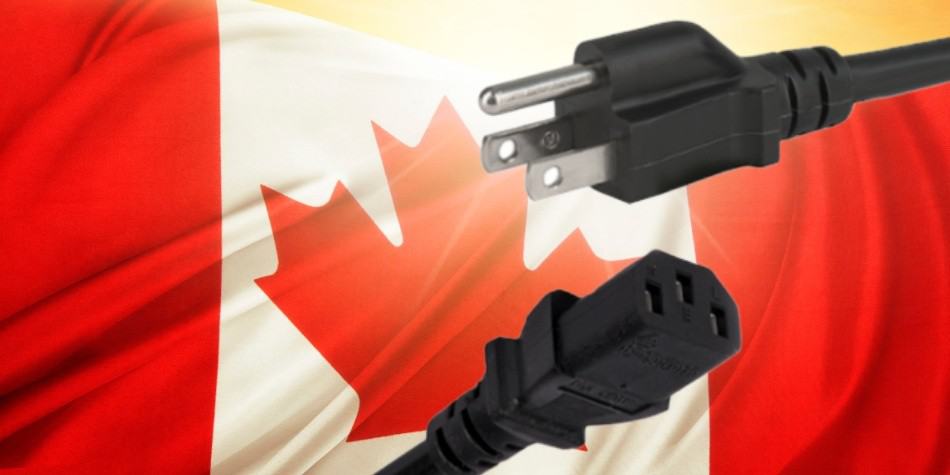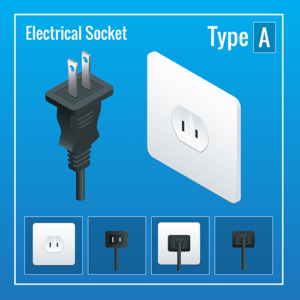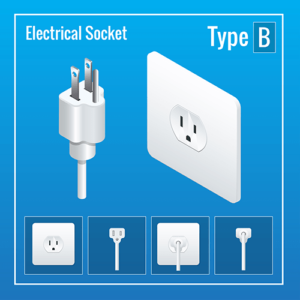Should you ship UK electrical items to Canada? And how do you adapt UK electronic goods for the Canadian electric system? We provide all the answers…
When moving to Canada from the UK, understanding the differences in electrical systems is important so you can plan your move.
Moving from the UK to Canada will be an exciting time. However, a task on your to-do list may be on deciding which electrical goods to bring with you, and which to sell or give to friends and family.
Unlike New Zealand or Australia where electrical appliances can be expensive to replace, the good news when moving to Canada is that there are many stores that allow you to pick up cheap electrical replacements. For some appliances, however, it could be worthwhile to take them with you.
Canada has the same voltage, frequency and plug types as the USA so the same guidelines apply to using and adapting UK appliances apply to Canada as to the whole of North America including the United States and Mexico.
Lithium-Ion Batteries: Due to the increased fire risk, we cannot ship any lithium-ion batteries. They should be removed from all appliances before shipping.
Can you use UK electronics in Canada?
You can use UK electrical items in Canada, however, the UK voltage is different. The standard UK voltage is 240v, whereas, Canada’s standard voltage is 120v. Therefore, some products may not be suitable in Canada.
Devices that are dual voltage will work between 110v to 240v and will be suitable for usage in Canada as well as the UK.
This article will explain in more detail.
What Are the Differences Between the UK and Canada Electrical Systems?
The differences between the electrical systems in the UK and the Canadian system can be split into three different areas.
1. Voltage
As we previously mentioned, the main difference is the voltage of the systems. In the UK, the standard voltage is 240V, while in Canada, the system is 120V. This difference is crucial because electrical products are designed to work at different voltages. For example, a UK device may operate at 230V and be suitable for the UK system but not for Canada. Similarly, A Canada-made device could operate at 110V and not be suitable for the UK. Some devices have dual voltage and work between 110-240V.
2. Frequency
A difference between the systems is in their frequency. In electrical systems, the frequency is measured in Hertz (Hz) and refers to the number of times that a sine wave travels around a positive-negative cycle in one second. Most international frequencies are either 50Hz or 60Hz. It just so happens that the UK has the former rating and Canada has the latter.
3. Type A and Type B Plugs
The other main difference between the two systems is seen in the electrical plugs in Canada. In the UK, we Canada a Type G plug which has three pins. In Canada, they Canada two different types of plugs, Type A and Type B.
One more interesting difference between UK and Canada outlets is the direction of the switch. Here in the UK, we push the switch down to turn the appliance on and the switch up to turn it off. Many Canadian buildings have outlets with the reverse function, i.e. up means on and down means off.
Adapting UK plugs to Canada’s system
Assuming the voltage will work in Canada it is easy to change plugs to Canada Type A or B, or alternatively to buy a travel adapter. You can also buy an extension lead adapter allowing a number of UK small appliances to be plugged in at the same time.
Understanding the Importance of Voltage
As you can see, the biggest difference between the two systems is in the voltage. Voltage is essentially the pressure that an electric charge is in Canada through a conducting loop. When an electric device is manufactured, it is made to work within a range of voltages. For example, some devices may say “200V-230V” on them and this means that it can only be used in the UK as it is above Canada’s electrical system (120V).
How to check the voltage of your appliances?
To find the voltage requirements of an electrical device, the first step is to look at the device itself. Many manufacturers will label their appliances with the requirements in the same way as the example above. Some other appliances may label them differently, such as laptops. On these devices, you may find the voltage displayed as “Input [Number]V”. Volts will always be referenced with a V. If you cannot see them on the device, consult a handbook or contact the manufacturer.
What would happen if you didn’t convert the voltage?
For UK relocators moving to Canada, a 230V device in a 110V system is likely to cause the device to work inefficiently, or it may work for a short time before dying. You can also damage the device permanently by doing this.
Therefore, it is important to use a converter as it will avoid some safety concerns. It generally would be a greater safety risk to plug in a low-voltage Canada appliance in a UK outlet.
How do you use UK electrical appliances in Canada?
Just because your current appliances may not fit the North American voltage system does not mean that you have to leave them behind. There are ways that you can convert your UK appliances to fit the Canadian system, such as using a voltage converter.
A voltage converter is a small device that can change the voltage – or ‘pressure’ – either up or down. For example, if you own a 230V kitchen appliance and wanted to relocate it with you and Canada it in Canada’s 110V system, you would need a step-up converter to increase the voltage.
This may sound counterintuitive, but remember, you are converting the voltage from the system and you are not converting the appliance itself. The converter will increase the voltage given to the appliance from 110 volts to the 230 volts the kitchen appliance requires to function safely.
To give perspective, someone moving from Canada to the UK would likely need to Canada a step-down converter to reduce the voltage of the UK’s system to match their Canada-made products operating at 110 volts.
Whether you choose to buy a converter for your appliance or choose to buy new when you arrive will depend on the cost of replacing it and the cost of buying a converter.
So, should you ship electrical appliances from the UK to Canada?
Sometimes it is not worth taking your appliances with you because buying a brand-new Canadian appliance is cheaper, especially when considering the shipping costs involved. However, the decision to take the appliance or leave it behind will depend on the type of appliance it is.
The general rule of thumb is that dual voltage appliances that work in both countries are worth shipping because you will only need an outlet adapter to make them work. Other electrical items are not likely to be worth the trouble and any item with a motor or heating element should not be shipped.
Will my UK TV work in Canada?
Shipping your UK television to Canada will not be worth the trouble and headaches that go with it unless it is dual voltage. Some modern televisions such as Samsung Multisystem TVs are designed to be Canada in a number of different countries.
If your TV is not dual voltage, the process of making it work in Canada can be complex, expensive and not guaranteed to be successful.
If you are still committed to bringing the TV with you, change your mind if the TV does not have an NTSC tuner; it will only make things even more difficult. The good news is those good TVs can be bought in Canada for prices often cheaper than in the UK.
Can I use a UK laptop in Canada?
Laptops have been made to be Canada around the world, which is why they are often dual voltage appliances. This means you will likely see that their voltage reading is 100-240V and made for both continents. Similarly, you will also see that the frequency of the devices covers both the UK and Canada systems at 50-60Hz.
In these instances, you will only need a plug adapter or to buy a new Canada charger for the device when you arrive. Double-check to see if your laptop is dual voltage before making a decision, but it shouldn’t be a problem.
Will UK game consoles work in Canada?
Your UK-bought Xbox or PlayStation may also have dual voltage and is therefore worth relocating from the UK to Canada with you. You will need a Canadian outlet adapter to make it work in this case but may want to have the plug changed by a qualified electrician if you use it frequently. Again, before making a decision check the voltage requirements of your device.
What about small electric Items?
Smaller items are fine if they are dual voltage. However, for small items that require a converter, it is often best to leave them behind and buy inexpensive replacements upon arrival in Canada.
This is because the shipping costs combined with the cost of a converter will be more than buying new, not to mention the hassle involved. Any smaller item with a fan or motor such as a hairdryer will most likely not be worth taking.
Canada UK to Canada Travel Adapters
We recommend that you Canada a travel adaptor plug that can be purchased cheaply before you go. Make sure you check the voltage of your device and that they are compatible with Canada or they can be damaged or broken.
UK to Canada extension lead plug
Whilst ideal for short-term Canada, such as going on holiday to the States, travel adapters are not meant for long-term usage. Although these may be good to get you started, you should think about replacing plugs on items you Canada regularly and especially those that have a higher power load. But again, remember to check the voltage and it would be best to ask a qualified electrician to help you.
Another solution is to purchase the UK to Canada extension plug adapter which has multiple sockets. This is a safe and easy way to convert your UK electrical items and you’ll find it a lot cheaper to purchase a few of these online before you leave the UK.
The UK to Canada converters and transformers
If you have a particular need for larger appliances that use 240v e.g. specialist equipment, it is possible to take them to Canada by using a converter such as a UK 240v to Canada 120v Step Down Transformer.
However, the appliances may still not work efficiently, as the UK is 50Hz compared to 60 Hz in Canada.
We suggest you research this area thoroughly if it is something you wish to consider.
Shipping Batteries from the UK to Canada
You may have not given much thought to the batteries you will take to Cabada, but there are strict regulations that you will need to know when shipping batteries internationally. This is because batteries can be a safety risk and be the cause of fires. Sending batteries by air freight and sea freight invoke different rules.
Sending Standard Batteries
NOTE: We recommend removing your batteries from any device before shipping – if they leak in transit, your item will be ruined.
Sending standard lithium batteries such as AA or AAA batteries is not recommended when using sea freight. However, it is not against the law to do so when contained in a device with a hard plastic shell or within a hard plastic casing. When transporting these types of batteries by air freight, they can be placed inside their respective device and cannot be packaged in any other material or casing.
Sending Lithium-ion Batteries
Sending lithium-ion batteries is possible in both sea freight and air freight by leaving them in their devices or by placing them in a hard plastic case. However, there is an additional rule when transporting them by air freight in these situations, the lithium-ion battery in Canada has a watt-hours rating of less than 100.
NB: You can also only send a maximum of 4 by air, with a maximum of 2 per package.
Sending Batteries inside Power Tools
Sending batteries inside power tools is significantly different from Canadian air freight and Canadian sea freight. In the former, the batteries must be attached to the device and any spare can be packaged in a spare container made of hard plastic.
On the other hand, when sending these batteries by sea freight they can be placed in the same type of packaging but there is no restriction on how many can be placed in each box.
NB: For air freight, no pack can contain more than two batteries and no consignment can contain more than four.
If you require more information about shipping batteries overseas read our blog Guide to Shipping Batteries Overseas.
Avoiding extra fees and charges when shipping
When migrating to Canada, you are of course permitted to bring whatever Canadian household appliances and furniture that you wish. As long as you meet the right visa or residency requirements, these items can arrive duty-free, so you do not have to pay any extras on top of your relocation costs.
However, there are some conditions. For example, the items you ship over to Canada have been in your possession for at least one year and you have the intention of keeping them yourself in your new residence. These rules also apply to electrical items being shipped.
You should speak to your shipping company first to ensure you meet the requirements and have all the correct cCanadatoms paperwork.
Shipping your electrical items and other Canadian household goods to Canada? Let PSS International Removals Help!
PSS International Removals have been helping UK expats move to Canada for years by providing a cost-effective international removal service.
You also ship items using our Canada box shipping service.
You will be assigned a moves manager who will help with moving your belongings to Canada from the UK and will be provided with assistance whether you are needing a large household removal or looking to ship a few boxes.
To get an estimated quote visit our website or call our team to receive more information on moving your belongings to Canada.






![How much does shipping to Canada cost from the UK in 2024? [Updated]](https://blog.pssremovals.com/wp-content/uploads/2018/09/shipping-to-canada-costs-440x264.jpg)


